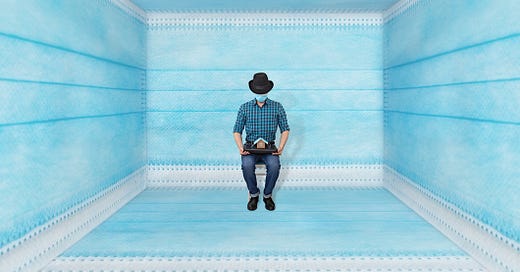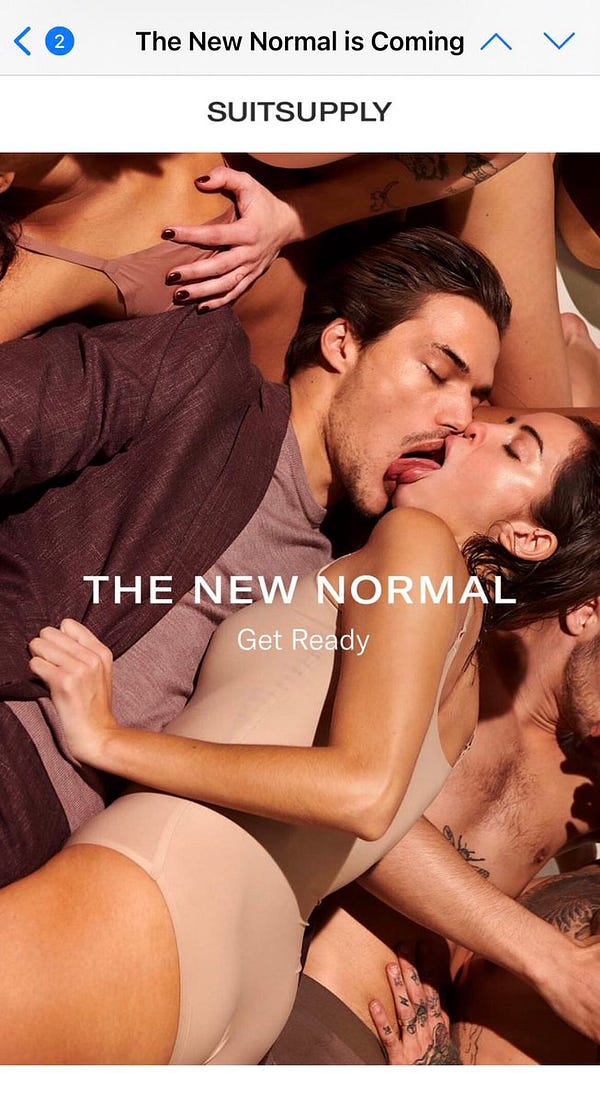Welcome to Galaxy Brain — a newsletter from Charlie Warzel about technology and culture. You can read what this is all about here. If you like what you see, consider forwarding it to a friend or two. You can also click the button below to subscribe. And if you’ve been reading, consider going to the paid version.
Reminder: Galaxy Brain has audio versions of the posts for you to enjoy. I’ve partnered with the audio company, Curio, to have all newsletters available in audio form — and they are free for subscribers.
On the morning of my first trip to the airport in 18 months, I turned to my partner and shook my head. “How did we do this?” I asked.
It was 4:15am, which is approximately the time that one needs to leave the house to catch a morning flight out of Missoula. This travel routine effectively incinerates a day and a half of your life. The night before leaving, you pack, you go to bed preposterously early. Then, you wake up three to four hours before dawn, you travel the bulk of the day, and you arrive at your destination feeling positively wrung out.
For the last few years I mostly ignored this fatigue and soldiered on. I’d become quite proficient at ignoring most of the signs my body was sending me. The afternoon before these flights, I’d start to get a restless kind of dread and sweaty palms. I am not afraid of flying, but on those evenings before the trip, I’d start to think about grim airplane crash scenarios. I slept fitfully those nights and often woke up in a cold sweat. I papered over this anxiety with a shallow sense of self-importance. I grew increasingly transfixed by my Delta airline status and mileage accrual. I prided myself on my familiarity/ability to navigate certain airports and their various lounges. I amassed hotel points like a real adult! I wasn’t miserable, you see, I was busy. I was important.
I’m cringing just typing this. Staring at my stupid Delta app, it now feels truly inconceivable that I could care — like actually have genuinely strong positive feelings — about something as trivial as a seat upgrade. It’s embarrassing but it’s also disorienting. It’s been less than two years since I departed “normal” life and yet I barely recognize many of my old behaviors. They feel as if they belong to a different person altogether.
Early this spring, when the delta variant and vaccine hesitancy were just glimmers in the public consciousness’ eye, I remember feeling some skepticism about everyone’s plans for a “hot vaxxed summer.” The idea seemed predicated on the assumption that most everyone was ready not just to snap back to pre-covid times, but to re-enter it with a new, orgiastic abandon. Covid’s over, baby! Put on your new suit and start sucking face!
I sound like a scold here, which is not my intention. I, too, was extremely excited to see friends without the necessary, tortured conversations about exposures, testing, and local positivity rates. I, too, yearned to have a long, carefree meal at a restaurant and sit at a favorite bar. I was thrilled this summer to do those things and I did them happily and masklessly. But I also suspected all my excitement and planning and celebration was also papering over — or, at the very least forestalling — my ability to process the trauma of the last year and a half.
Where, I kept thinking, is that conversation — the one where we attempt, even just superficially, to contextualize the unimaginable national and global grief we’ve been living with? Where was the acknowledgement that even the luckiest of us would emerge from this dark period as different people? As July 4th crept up on us, I watched Joe Biden declare independence from Covid (a bit premature, it seems). While the president memorialized the hundreds of thousands dead, I found it notable that there was little mention of any of the ways the pandemic might have changed or scarred us. Instead, the focus was on the future and on moving forward — which, coincidentally, sounded a lot like snapping back to pre-pandemic life.
In my personal life, I also tried to move forward this summer. Once again, I attempted to ignore the signals my body was sending me. As my calendar filled up and a familiar anxiety came back, I convinced myself I was merely out of practice in my social life. If I just fought through, then, perhaps, I could end up back where I was before — well adjusted and…normal. But, try as I may, the anxious feelings only intensified with re-entry. My pandemic summer, while not even that busy, felt like it was spiraling out of control.
(I want to acknowledge here that I’ve been as lucky and privileged during this pandemic as anyone could possibly be. That I have room in my life to comfortably adapt to the pandemic is the purest example of this privilege. I’m sharing these reflections in the hope that they might put words to what some of you might also be feeling during this uncertain summer.)
I didn’t allow myself to realize any of this until the day of my grandmother’s funeral. The truth avails itself in unexpected ways and my revelation came in the form of a pair of suit pants. I slid them on absentmindedly for the first time in two years and noticed the fit was dramatically different. I’ve struggled with my weight for years and am no stranger to the terror of a tightening waistband. But this sensation was different. The ill-fitting pants were not the result of a garden variety weight gain, but a kind of transformation. The pants were preposterously tight in some areas and billowy in others. It felt like borrowing a friend’s clothes after misjudging their proportions.
Standing in these strange pants, I recalled the last two years, much of it spent furiously, obsessively cycling on stationary and outdoor bikes. Riding has been a fraught outlet for me. I’ve used it to ward off anxiety. Other times, I’ve used it as a form of, I dunno, self-punishment. Primarily, I’ve used it to exercise control over something — anything — in my life. The infernal bike provided me with a schedule and concrete goals when the days melted into each other. In the process, it transformed me physically in ways I couldn’t even recognize.
Realizing your pants don’t fit isn’t the most profound revelation, I know. But, oddly-fitting trousers were the apt physical metaphor I needed to realize the enormity of the last two years. Mentally, physically, I’d undergone a change. In every way, there is more of me today than there was in February 2020. More grief, more distrust, more anger, more anxiety, more hope, more empathy…more everything. For the first time, trapped at home and not performatively busy, I’ve been able to recognize these emotions. I’ve learned more about myself and what I love and what I fear in the last eighteen months than I learned in my first 33 years. In brief moments, these revelations have been life-affirming. But many have been quite painful. I’m not okay yet. And, again, I’d argue I’m one of the lucky ones.
Perhaps the most surprising element of this change is how durable it feels. Before the vaccines arrived, I imagined that I’d be slower than some of my friends and family to adapt to re-entry, but that I’d mostly snap back to the way I’d been before. Now, I know that’s not true. Many of my priorities have changed drastically since the pandemic began. I have, for the first time perhaps, developed an acute sense of home and place and family. I feel a loving, gravitational pull when I’m too far away. Social and professional status — the forces that shaped many of my life decisions and daily rhythms — now feel almost trivial at times. In April, I quit my job — the type of job I’d coveted my whole career. Before the pandemic, I rarely allowed myself the time to contemplate uncertainty about the future. Now, uncertainty is a guiding force in my life. I plan tentatively and humbly, if at all.
There are darker elements at play, too. Like so many others, I am disillusioned by government ineptitude in parts of public health messaging and global vaccine distribution. I’m frightened by the pandemic grifting and disinformation. I am furious at big swaths of this country for their narrow and reckless interpretation of freedom. Some of that distrust and anger and loss of faith won’t go away.
None of what I’m describing is inherently good or bad. The point isn’t that the pandemic made me a better or worse person but that it has made me a different person. Maybe this sounds blindingly obvious to you. But I’m not sure many of us have really reckoned with the ways we’ve changed — especially those darker observations.
Since the beginning of the pandemic, the word “normal” has felt so weighted and fraught. So many of us yearned for a return to normalcy, while others reminded us that normal was pretty shitty for a majority of people. Some of us braced and planned for an uncertain future — a Brave New Normal. Others talked about using the moment to usher in a hopeful, more equitable new normal. A different group (usually those with money and power and status) have fought to drag us back to their desired normal, preferably with no lessons learned. Personally, I’ve come to accept that normal is a nonsense word that is mostly a stand-in for feeling comfortable and certain.
In my own life, I’ve come to understand that much of the comfort and certainty I felt was also a lie. It was a trick I played on myself in order to feel important or in control. Normal often meant ignoring how I actually felt.
Like everyone else, I’m staring down a calendar packed with uncertainty and unease. I’m anxious about the future, grateful for the gifts of the present (vaccines, in-person time with friends and loved ones), and trying to remain cautiously optimistic. I’m overwhelmed but I do feel more prepared for the days ahead, in part because I know that I’m not going back to the way I was before. There’s more of me now than there was before. My task is figuring out what to do with it all.
Ok! That’s it for today. If you read this newsletter and value it, consider going to the paid version, and come hang out with us on Sidechannel, the Discord you’ll get access to if you switch over to paid.
If you are a contingent worker or un- or under-employed, just email and I’ll give you a free subscription, no questions asked. If you’d like to underwrite one of those subscriptions, you can donate one here.
If you’re reading this in your inbox, you can find a shareable version online here. You can follow me on Twitter here, and Instagram here. Feel free to comment below — and you can always reach me at charliewarzel@gmail.com.







Charlie once again putting the outright weird incomprehensible mess of my covid feelings into perfect eloquent words. Thanks man. As other Alex said, I love this newsletter
“The point isn’t that the pandemic made me a better or worse person but that it has made me a different person.”
So well stated. As someone who also made some big life changes in the past year and a half, I can relate!